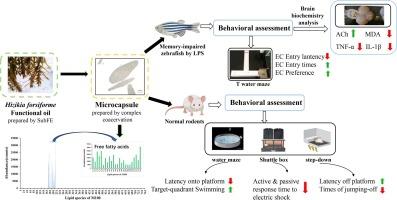亚临界萃取和复合共包埋法制备的Hizikia forsiforme功能油微胶囊(HFFOM)的记忆改善作用
IF 3.8
2区 农林科学
Q2 FOOD SCIENCE & TECHNOLOGY
引用次数: 0
摘要
功能食品在改善阿尔茨海默病和衰老引起的记忆力衰退方面具有前景。在之前的研究中,食用海藻 Hizikia fusiforme 功能油(HFFO)可抑制乙酰胆碱酯酶,防止细胞神经炎症,改善斑马鱼模型的记忆缺陷。为了实现更绿色的制备和脂质氧化缓解,并研究其对高等动物的影响,有必要进行更多的研究。本文通过亚临界流体萃取 HFFO 和连续复合包埋制备了水溶性抗氧化微胶囊 HFFOM,在不同行为测试中对 LPS 损伤斑马鱼和正常啮齿动物显示出体内记忆改善作用。HFFOM 能提高神经递质乙酰胆碱的水平,同时降低斑马鱼大脑中 MDA、IL-1β 和 TNF-α 的水平。LC-MS/MS 和脂质体分析表明,其改善记忆的主要成分是亚麻酸、芥酸、神经酸、花生四烯酸、亚油酸、二十碳三烯酸、二十二碳六烯酸和二十二碳五烯酸。这项研究揭示了 HFFOM 在开发增强记忆功能食品或药物方面的潜力。本文章由计算机程序翻译,如有差异,请以英文原文为准。

The memory-improving effect of Hizikia forsiforme functional oil microcapsule (HFFOM) prepared by subcritical extraction and complex coacervational embedding
Functional foods are prospective in improving memory decline caused by Alzheimer’s disease and aging. The Edible seaweed Hizikia fusiforme functional oil (HFFO) inhibited acetylcholinesterase, prevented cellular neuroinflammation, and improved memory deficits in zebrafish models in the previous studies. To realize its greener preparation and lipid oxidation mitigation and study its effects on higher animals, more investigations are necessary. Herein, sub-critical fluid extraction of HFFO and successive complex coacervation embedding yielded a water-soluble and anti-oxidative microcapsule HFFOM, which displayed in vivo memory-improving effects on LPS-injured zebrafish and normal rodents in different behavior tests. HFFOM can elevate the level of the neurotransmitter acetylcholine while decreasing the levels of MDA, IL-1β, and TNF-α in the zebrafish brain. LC-MS/MS and lipidomic analysis suggested its predominant memory-improving ingredients to be linolenic, erucic, nervonic, arachidonic, linoleic, eicosatrienoic, docosahexaenoic, and docosapentaenoic acids. This study enlightens the potential of HFFOM in developing memory-enhancing functional foods or drugs.
求助全文
通过发布文献求助,成功后即可免费获取论文全文。
去求助
来源期刊

Journal of Functional Foods
FOOD SCIENCE & TECHNOLOGY-
CiteScore
9.60
自引率
1.80%
发文量
428
审稿时长
76 days
期刊介绍:
Journal of Functional Foods continues with the same aims and scope, editorial team, submission system and rigorous peer review. We give authors the possibility to publish their top-quality papers in a well-established leading journal in the food and nutrition fields. The Journal will keep its rigorous criteria to screen high impact research addressing relevant scientific topics and performed by sound methodologies.
The Journal of Functional Foods aims to bring together the results of fundamental and applied research into healthy foods and biologically active food ingredients.
The Journal is centered in the specific area at the boundaries among food technology, nutrition and health welcoming papers having a good interdisciplinary approach. The Journal will cover the fields of plant bioactives; dietary fibre, probiotics; functional lipids; bioactive peptides; vitamins, minerals and botanicals and other dietary supplements. Nutritional and technological aspects related to the development of functional foods and beverages are of core interest to the journal. Experimental works dealing with food digestion, bioavailability of food bioactives and on the mechanisms by which foods and their components are able to modulate physiological parameters connected with disease prevention are of particular interest as well as those dealing with personalized nutrition and nutritional needs in pathological subjects.
 求助内容:
求助内容: 应助结果提醒方式:
应助结果提醒方式:


